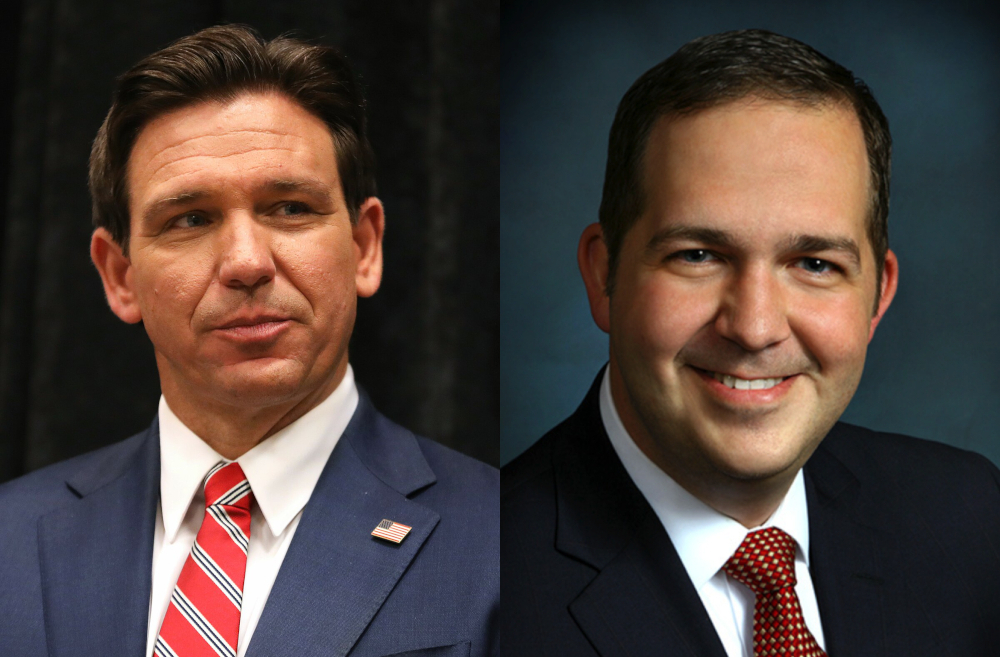Intoxicating hemp substances will remain on the market in Florida after Gov. Ron DeSantis nixed a proposed law that would have banned products containing them.
DeSantis on Friday vetoed Senate Bill 1698 (SB 1698) which would have specifically prohibited ingestible or inhalable products that contain delta-8 THC, delta-10 THC, HHC, THCP and THCV – synthetic “high”-producing compounds that are in gummies and other treats widely available across the U.S.
The products, which remain legal in Florida under some restrictions, represent competition to the state’s legal medical marijuana sector, and future competition to any companies that could be licensed to sell marijuana if a referendum to legalize pot in the state is passed this November.
Critics have said DeSantis, a staunch marijuana opponent, cut a deal with stakeholders who lobby in favor of the hemp products, suggesting the governor vetoed the measure in exchange for help in financing his effort to defeat the pot initiative. That puts him in the unusual position of supporting psychoactive products made from hemp while working against marijuana legalization.
The Florida Healthy Alternatives Association, a hemp trade group, paid $155,000 to lobbyists during the first three months of this year, according to a CBS Miami report. One of the hemp association’s key lobbyists is Evan Power, chairman of the Republican Party of Florida.
Weed vs. hemp
In states where recreational marijuana is already legal, weed stakeholders have fought against the hemp intoxicants, arguing they represent unfair competition because they are not subject to licensing fees and regulations.
The bill that was vetoed by DeSantis would have gone beyond a law signed by the governor last year by banning the products altogether. That law (Senate Bill 1676 – SB 1676), now in effect, allows the products but prohibits marketing them to children, sets an age limit of 21-and-over for sales, and carries packaging requirements.
Florida lawmakers who drafted the law struck down by DeSantis said they intended to eliminate the risk of over-ingestion of the substances, variously referred to as “diet weed,” “gas station pot,” or “marijuana light.” In committee meetings ahead of the 2024 legislative session, lawmakers heard reports from health officials about children having ingested such products, sometimes leading to hospital visits.
Tighter rules urged
DeSantis in part addressed those concerns in a letter announcing his veto to Secretary of State Cord Byrd, suggesting that when the legislature next convenes, lawmakers should shore up current law by putting the products behind the counter and requiring retailers who sell them to be located away from schools, religious institutions and other areas where children gather.
“Packaging should – by default – be child-resistant, and any and all advertising that makes these products attractive to minors should be prohibited,” the governor suggested in the letter.
He also called for more detailed labeling that includes cannabinoid content levels, information about the source of ingredients and dosing instructions.
DeSantis said the Florida Legislature should also set standards for hemp farming, processing and handling “to ensure the purity, potency, and safety of hemp and hemp-derived products,” and recommended “random, unannounced inspections, standardized and repeated testing, and dosing, packaging and unit purchase caps that better correspond to the chariacter of the products and their intoxicating capabilities.”
“Sensible, non-arbitrary regulation will provide businesses and consumers alike with much-needed stability – safeguarding public health and safety, allowing legitimate industry to flourish, and removing bad actors from the market,” DeSantis added.
National problem
States across the USA are working to reign in the intoxicating hemp products, with some banning them altogether and others imposing strict rules. Many producers and sellers have received warnings from the U.S. Food & Drug Administration (FDA) regarding the safety of the products. FDA said it has received reports of serious adverse events from consumers, and at least one child’s death in Virginia was attributed to the accidental consumption of delta-8 THC, the most popular of the hemp-derived synthetic compounds.
Florida agriculture officials have said nearly 1,000 calls were made to Florida’s Poison Information Centers in 2022 after children were exposed to high-potency THC products made from hemp. The Florida Department of Agriculture and Consumer Services (FDACS) said it has uncovered more than 107,400 packages of hemp extract products targeting children since July 1, 2023. That’s when the state began tracking the dangerous products through “Operation Kandy Krush,” a statewide inspection sweep by the FDACS that started when DeSantis signed the law banning such marketing practices.
Synthetic intoxicants
Most of the intoxicating hemp compounds at issue are made by putting hemp-derived CBD through a synthetic process to produce the highly concentrated psychoactive substances. They produce effects similar to those produced by delta-9 THC, the common intoxicant found in marijuana.
Products containing the substances emerged after the 2018 Farm Bill legalized industrial hemp and its downstream products across the U.S. The federal law created a loophole by not accounting for synthetically produced psychoactive products that can be made from hemp flowers.
Stakeholders have said the law vetoed by DeSantis would also have wiped out the state’s $1.8 billion market for CBD extracts sold over the counter as health palliatives because it proposed highly restrictive limits on trace amounts of THC that are naturally present in those products. That figure is dwarfed, however, by CBD sales that underlie the market for the unregulated hemp intoxicants, which industry stakeholders claim exceeds $10 billion. They also claim the sector provides jobs for more than 100,000 Floridians.
A Fort Lauderdale-based company that sells the psychoactive hemp products has a suit pending over the 2023 legislation that put restrictions on the compounds which argues that the state overstepped its authority by regulating hemp products

